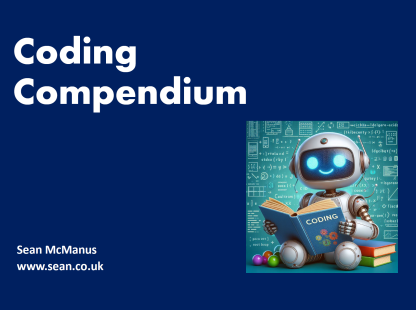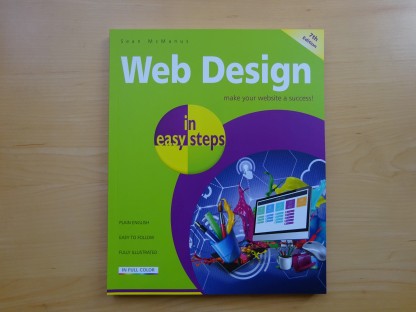
Coding Compendium
A free 100-page ebook collecting my projects and tutorials for Raspberry Pi, micro:bit, Scratch and Python. Simply join my newsletter to download it.
Making Music: March 2000
Sean McManus finds out how Stumble topped the charts at Peoplesound.com
"The internet won't sell records," says Neil Cooper, manager of Stumble, a new band distributing their music through Peoplesound.com. "It's just distribution. You don't go into a shop and look at a sleeve and say 'that's good, I'll buy it'".
Peoplesound launched last October with extensive publicity and one hundred pound cash advances to encourage bands to sign up. The label places a chart of the most popular artists on the homepage to help steer site visitors to new bands. To ensure acts don't become entrenched at the top forever, bands are removed after a few weeks. Stumble spent five weeks at the top of the chart and although sales figures have yet to be reported, Cooper is optimistic. "Stumble make money on the first single sold," he says. "Over the last 18 months we've been putting out seven inches and building up a buzz nationally. But you don't make any money until you've sold about 600 that way."
Peoplesound cuts costs by offering music for sale as a downloadable file and by making CDs to order, covering the costs as sales come in. Fans are arriving at Stumble gigs with Peoplesound CDs for the band to sign. "For alternative rock bands, most of the fans want the package, so we will probably sell more CDs than downloads," says Cooper.
All of a sudden we have an international outlet and people can easily see what we look like and hear what we sound like. It's fantastic.
The band owes its chart success in part to extensive media coverage. The internet single has been played on Steve Lamacq's Evening Session, XFM, John Peel's show and has been reviewed by the NME and Kerrang. The secret was employing a press agent and radio plugger to promote the single the same way as a conventional CD release, encouraging journalists to mention the website where the single can be bought.
"Some bands might give the music to Peoplesound and think that's it. But it's like putting a record in a shop and not telling anybody it's there," says Cooper. Even with the White Book as your guide (check your library), finding a good agent from the directory is difficult. "You can't buy enthusiasm," warns Cooper. "If their attitude is 'we'll see what we can do', it won't work. Make sure you find someone who likes the music and then tell them what you can afford. You're still going to have to put your hand in your pocket, but if you're pressing 2000 singles and not making any money, it's better to press fewer and pay a press agent and radio plugger."
Cooper advises bands that don't want to hire promoters to use the bits of magazines that they can get into, such as gig listings and demo review columns. Many specialist radio programmes will also play new bands, particularly late night shows. Cooper also advises bands to work with fanzines in promoting the music and the website. "Fanzines will be loyal," says Cooper. "They will like the band for a reason, not because a major record label is spending half a million on advertising in the publication. Cynical, but it does happen, sadly."
Playing live is important and bands should take every opportunity to promote their website address, Cooper says. "Even if it's only the Kebab and Calculator, gigging around the single release helps. On all our fliers and singles we include our website address. If you take the internet out of the equation, you would still always put your PO Box on everything."
The band also keeps an electronic mailing list to make it easier to keep in touch with fans. "We have 1500 address on our mailing list," says Cooper. "We were featured on the Buzz chart of new releases on Steve Lamacq's Radio One website. We got 800 votes and beat bands like the Beastie Boys. We emailed our database and invited fans to vote and they did! There's no way we could have done that with normal mail."
Conventional real-world promotion has clearly helped Stumble to chart on the internet, but the internet can also bring new listeners to the music. "All of a sudden we have an international outlet," says Cooper, "and people can easily see what we look like and hear what we sound like. It's fantastic."
© Sean McManus. All rights reserved.
Visit www.sean.co.uk for free chapters from Sean's coding books (including Mission Python, Scratch Programming in Easy Steps and Coder Academy) and more!

A free 100-page ebook collecting my projects and tutorials for Raspberry Pi, micro:bit, Scratch and Python. Simply join my newsletter to download it.

Web Design in Easy Steps, now in its 7th Edition, shows you how to make effective websites that work on any device.

Power up your Microsoft Excel skills with this powerful pocket-sized book of tips that will save you time and help you learn more from your spreadsheets.

This book, now fully updated for Scratch 3, will take you from the basics of the Scratch language into the depths of its more advanced features. A great way to start programming.

Code a space adventure game in this Python programming book published by No Starch Press.

Discover how to make 3D games, create mazes, build a drum machine, make a game with cartoon animals and more!